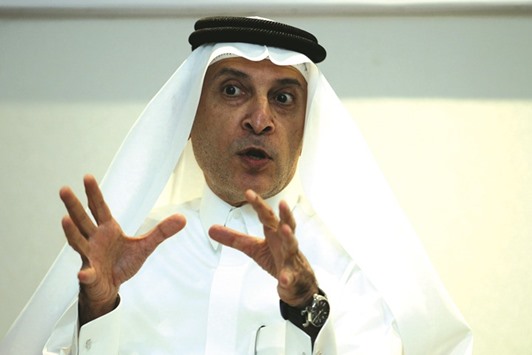Qatar Airways chief executive officer Akbar al-Baker said he intends to make more investments in other airlines this year as the Gulf carrier seeks opportunities to expand.
“We are looking at many airlines,”al-Baker said in an interview at the Bahrain Air Show, declining to identify potential targets.
“Either they will be successful airlines or they will be airlines where we see there is high potential and that potential is not being properly exercised.”
The state-owned airline bought a 10% stake in British Airways’ parent IAG last year, and adding more investments would bring it closer to a strategy pursued by Etihad Airways, the Abu Dhabi flag carrier that’s snapped up equity holdings in carriers from Air Berlin to Air Seychelles.
Airlines in the Gulf have used their favourable geographic position at the crossroads of global flight paths, building giant transfer hubs that connect passengers between Asia and Europe and the US with just one stop-over in the Gulf.
At the same time, the airlines face potential limitations to their growth plans as the US and some European carriers seeks to rein in their expansion. Al-Baker has talked about forming a splinter group within the Oneworld alliance.
Qatar Air had previously said it was considering an investment in Royal Air Maroc and had expressed interest in increasing its IAG stake after making the initial investment.
The Gulf carrier was scheduled to take delivery of the first Airbus A320neo by the end of last year but has faced delays due to shortcomings of the engines, al-Baker said, citing issues with performance in the region’s high temperatures.
Deutsche Lufthansa, in the meantime, became the first carrier to receive the Airbus plane, taking delivery this week.
“We need an engine that will withstand this rigorous climate conditions,” al-Baker said, adding that it will be several more months before Qatar Air gets its first A320neo.
“It’s extremely important for us to take delivery of this airplane because we’re short of capacity.”
In a bid to offset the impact, Qatar Air will add ultra-long haul routes with new flights to Chile’s capital Santiago and Auckland in New Zealand using Boeing 777-LR aircraft. The airline will also deploy Airbus A350s on more routes this year, including Phuket, Marrakesh and Lisbon, al-Baker said.
Meanwhile, Qatar Executive, Qatar Airways’ corporate jet division, has revealed its new Gulfstream G650ER and officially welcomed the aircraft into the fleet with a ribbon-cutting ceremony at the Bahrain International Air Show, reports the official Qatar News Agency (QNA).
The aircraft was inaugurated by Qatar’s Minister of Transportation, HE Jassim Seif Ahmed al-Sulaiti and al-Baker.
Al-Baker said: “We are delighted to reveal the Gulfstream G650ER here at the Bahrain International Airshow. It is with enormous pride that we welcome the industry’s most advanced business jet into our fleet.
“We look forward to offering our valued and discerning customers the opportunity to experience this new-generation aircraft, the next time they fly with Qatar Executive.”
It was the first time the jet has been showcased to the public since it was handed over to Qatar Executive by Gulfstream at its headquarters in Savannah in December last year. This aircraft is the first of an order by Qatar Executive for up to 30 business jets, including its all-new G500 and G600, for which the airline is the global launch customer.
As the world’s largest and fastest civilian aircraft, the Gulfstream G650ER is one of the most sought-after business jets thanks to its phenomenal range, industry-leading cabin technology and unparalleled cabin comfort.
The Qatar Executive G650ER aircraft can fly non-stop from the Middle East to North America or from destinations in Asia to Africa – farther, faster than any other jet of its kind – and is perfectly suited for those whose travel needs include flying halfway around the globe.
CEO rejects consolidation in Gulf region
The CEO of Qatar Airways said he was not in favour of regional consolidation, rejecting any need for the Gulf region to join in the trend for mergers which has raised airline profitability elsewhere in the world, reports Reuters.
In other aviation markets, like the US, the number of airlines has shrunk as carriers have consolidated, helping them become more profitable, so much so that US airlines now account for more than half of global earnings in the airline industry. But Qatar Airways CEO Akbar al-Baker said consolidation could be bad for consumers. “I don’t agree with consolidation, always done to extract capacity and jack up prices,” al-Baker said during a panel at the Bahrain Airshow yesterday, pointing to US carriers as an example.
In Europe, there has already been some consolidation, with the five largest airline groups now controlling around half of the journeys made by air passengers in the region.
Al-Baker also took a swipe at legacy European carriers, saying they were disadvantaged by their own inefficiencies, not by the growth of Gulf carriers.

Al-Baker addressing a news conference at the Bahrain Air Show yesterday.
